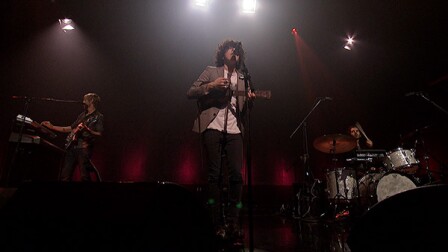
The Anachronistic Sounds of Noah and the MegaFauna
Django Reinhardt was a Romani-French guitarist who was most active in the 1930s and '40s, played in a way that was unlike any other musician of the time. His jazzy style was born of necessity. Reinhardt lost the use of two of his fingers after injuries sustained in a fire. He could no longer play using conventional techniques.
Django has influenced a lot of musicians, including a young Texan kid named Noah Lit. Today, Lit fronts his big band Noah and the MegaFauna, whose sound takes roots in his early gravitation towards the music of the pioneering jazz guitarist. "You couldn't learn that style," he says, "because nobody that I had heard of in the whole entire state of Texas knew how to play like that."
Years later, when Lit was an adult who had been in his own band playing rock music on an electric guitar, things changed. Now, he could search video tutorials online and watch people who were deeply entrenched in Reinhardt's work. He could learn to play in the style of the legend. Lit spent a year pouring over those tutorials.
Lit explains how this changed Reinhardt's playing, with the musician essentially shifting the positioning of the neck of his instrument. "It became lateral instead of vertical," he says. That makes a different. "It changes the way that you play," says Lit.
Where Reinhardt developed a unique style of playing guitar to overcome a physical challenge, Lit turned to Reinhardt as inspiration to overcome a creative one. When Lit's old band, Oliver Future, split, he wanted to move away from electric guitar. Delving into the jazz sounds for which Reinhardt was famous was a departure from what he done previously. "You kind of have to hold the guitar different and there's different patterns and different fingerings and everything," he says.
Lit worked on his playing, writing new music along the way. Quickly, he had cobbled together ten songs. Lit needed a band, so he brought in his brothers Josh and Gabriel, to make a record. Many more members eventually joined with them to form Noah and the Megafauna. "Anthems for a Stateless Nation" came out in 2011 and the release fared pretty well for the team. One of the songs landed in the Judd Apatow movie "This is 40."
Ultimately, the sound departed from its original influence. "Django was kind of the start but I really wanted to fuse in some of my other people that I've always loved like Tom Waits and Charles Mingus on some of the horn arrangements and I wanted to do something kind of jazzier," says Lit. It's not what others would consider jazz, he stresses. "To me, this is as jazzy as well ever get," he says.
Noah and the Megafauna, though, has the sound of dimly lit club in black-and-white film. It's filled with big horns, complicated guitar work and Lit's croon. It's almost a throwback to vintage times, but there's always something pulling it back into the 21st century. And then, there is something acknowledging a much more ancient pass.
Lit notes the cover of "Anthems for a Stateless Nation." Large animals crowd towards the front of an ark. They appear to be howling in unison, heads aimed towards the stormy-dark sky. Waves crash up against the side of the boat. A guitarist is perched on the front as though he were a figurehead. They are caught up in Old Testament calamity. When you're named Noah, the old tale can resonate with you. "The guy that survives the apocalypse," Lit says, is a point of personal fascination.
"Anthems for a Stateless Nation" began as a concept album. "This narrative of the great panic," Lit describes it. Lit talks of hard times as a focal point of the record, of trying to "sail above it" and making a fresh start. It's the mythology of Noah and his ark filtered through music that harks back to the Great Depression, but made during the Great Recession.
Lit, who is 35, began exploring this musical interest in about 2008. "It was kind of right when when Obama was taking office and it seemed like things were going to get better and the the financial markets just dropped out," he says.
The first song on the album, "We Knew We Had It Coming," deals with feelings of responsibility for awful times. "It's kind of a response to just this growing darkness over the past couple of years, I guess," he says. The album ends with "We'll Sail Above This," a song that Lit wrote with author and friend Will Chancellor. He says that the alternative title was "Screw You Goldman Sachs." Lit elaborates, "You ran things into the ground and now we'e going to go up and above you." They wrote the song the night before Lit headed into the studio. While recording, he opted for something a bit different. He recalls saying, "Guys, we can't end the record on this dark note. there has to be some sort of hope and promise at the end of it." Thus, "We'll Sail Above This" became the album's rainbow.
"I don't really necessarily want people to think of this as a strictly political band,"says Lit of the album, "but there are certainly political and if not political, allegorical themes that run through it."
It's not necessarily a path that the band will continue to pursue. Noah and the Megafauna are working on a new album. Right now, there's no title, although Lit mentions that the working title is "Rock and Roll?" The band hasn't changed. Some of the influences have a little. Lit has been finding some inspiration in 1960s rock records. He says that the record is more personal as well. "The last one I was able to not be quite as personal because there was this story," he says. "This is more about a place that I've been in for the past year or so."











